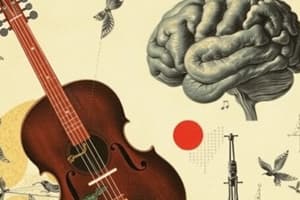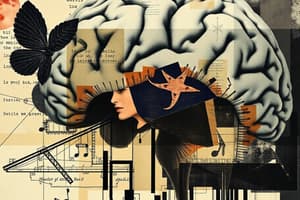Podcast
Questions and Answers
Which activity stimulates the brain the most?
Which activity stimulates the brain the most?
- Playing a sport
- Listening to music (correct)
- Going to the gym
- Reading a book
What happens when vibrations from music reach our ears?
What happens when vibrations from music reach our ears?
- They improve sleep quality and mood
- They tickle the eardrum and travel to the brain stem (correct)
- They cause pain and anxiety
- They create an electrical signal that is transmitted to the brain
Which of the following is NOT a benefit of listening to music?
Which of the following is NOT a benefit of listening to music?
- Reducing anxiety
- Enhancing memory
- Improving sleep quality
- Increasing blood pressure (correct)
What is the purpose of the research conducted by Johns Hopkins researchers?
What is the purpose of the research conducted by Johns Hopkins researchers?
What is the connection between music and brain engagement throughout the aging process?
What is the connection between music and brain engagement throughout the aging process?
Flashcards are hidden until you start studying
Study Notes
Music and Brain Stimulation
- Engaging in musical activities, such as playing an instrument or singing, activates multiple areas of the brain, enhancing cognitive functions and neurological pathways.
- Music can improve memory, attention, and learning capabilities, making it a powerful tool for mental stimulation.
Effects of Music Vibrations
- Vibrations from music travel through the air and are captured by the ear, stimulating the auditory system.
- When these vibrations reach the inner ear, they are converted into electrical signals sent to the brain, eliciting emotional and physical responses.
Benefits of Listening to Music
- While listening to music has numerous advantages, one misconception is that it improves sleep quality for everyone; this effect can vary between individuals.
- Common benefits include reduced stress, improved mood, and enhanced cognitive performance.
Research by Johns Hopkins
- Johns Hopkins researchers aim to explore the relationship between music and brain health, specifically in how it affects cognitive capabilities and emotional well-being.
- Their studies investigate potential therapeutic applications of music, particularly in aging populations and those with neurological disorders.
Music and Aging Process
- There is a strong correlation between music engagement and maintaining cognitive function in older adults.
- Regular interaction with music is associated with delayed onset of cognitive decline and enhanced neural connectivity, supporting overall mental health in aging individuals.
Studying That Suits You
Use AI to generate personalized quizzes and flashcards to suit your learning preferences.




